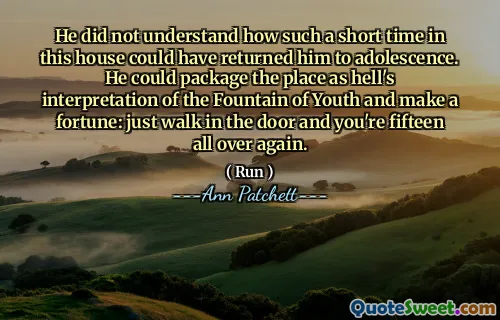
He did not understand how such a short time in this house could have returned him to adolescence. He could package the place as hell's interpretation of the Fountain of Youth and make a fortune: just walk in the door and you're fifteen all over again.
This excerpt beautifully captures the enigmatic power that certain environments have over our psyche and sense of time. The notion of being transported back to adolescence by simply entering a particular place taps into a universal experience — that sometimes, places are not just physical locations but vessels of emotion and memory that can resurrect parts of our past selves. The phrase "hell's interpretation of the Fountain of Youth" is particularly striking; it suggests that this return to youth isn’t an innocent or purely delightful rejuvenation but perhaps a tumultuous, haunting, or even painful revisiting of a time filled with complexity and vulnerability. It challenges the romanticized image of youth by framing this physical and emotional regression as something almost sinister or unsettling.
Moreover, the idea of commodifying such an experience highlights our culture’s obsession with reclaiming lost youth. The fantasy of instantly becoming young again is compelling, but the quote subtly warns about the costs and implications of such a reversal. We might physically remain where we are in time, but emotionally or mentally returning to our younger selves could trap us in unresolved conflicts or immature states of mind, effectively making the experience a double-edged sword.
This reflection pushes one to consider the fluidity of time within ourselves and how our surroundings can impact us profoundly. The house in the quote becomes a symbol not just of place but of psychological states, memory, and the cyclical nature of growth and regression. It invites a deeper meditation on how confronting our younger selves is both a haunting and potentially healing process.






